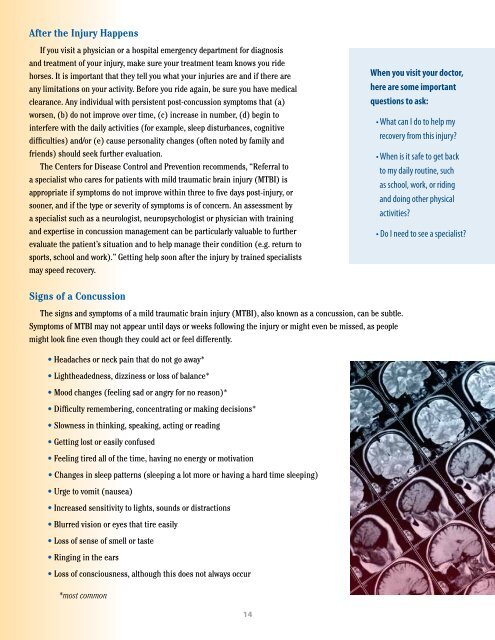Horse Related Injury Brochure - Alberta Equestrian Federation
Horse Related Injury Brochure - Alberta Equestrian Federation
Horse Related Injury Brochure - Alberta Equestrian Federation
You also want an ePaper? Increase the reach of your titles
YUMPU automatically turns print PDFs into web optimized ePapers that Google loves.
After the <strong>Injury</strong> Happens<br />
If you visit a physician or a hospital emergency department for diagnosis<br />
and treatment of your injury, make sure your treatment team knows you ride<br />
horses. It is important that they tell you what your injuries are and if there are<br />
any limitations on your activity. Before you ride again, be sure you have medical<br />
clearance. Any individual with persistent post-concussion symptoms that (a)<br />
worsen, (b) do not improve over time, (c) increase in number, (d) begin to<br />
interfere with the daily activities (for example, sleep disturbances, cognitive<br />
difficulties) and/or (e) cause personality changes (often noted by family and<br />
friends) should seek further evaluation.<br />
The Centers for Disease Control and Prevention recommends, “Referral to<br />
a specialist who cares for patients with mild traumatic brain injury (MTBI) is<br />
appropriate if symptoms do not improve within three to five days post-injury, or<br />
sooner, and if the type or severity of symptoms is of concern. An assessment by<br />
a specialist such as a neurologist, neuropsychologist or physician with training<br />
and expertise in concussion management can be particularly valuable to further<br />
evaluate the patient’s situation and to help manage their condition (e.g. return to<br />
sports, school and work).” Getting help soon after the injury by trained specialists<br />
may speed recovery.<br />
When you visit your doctor,<br />
here are some important<br />
questions to ask:<br />
• What can I do to help my<br />
recovery from this injury<br />
• When is it safe to get back<br />
to my daily routine, such<br />
as school, work, or riding<br />
and doing other physical<br />
activities<br />
• Do I need to see a specialist<br />
Signs of a Concussion<br />
The signs and symptoms of a mild traumatic brain injury (MTBI), also known as a concussion, can be subtle.<br />
Symptoms of MTBI may not appear until days or weeks following the injury or might even be missed, as people<br />
might look fine even though they could act or feel differently.<br />
• Headaches or neck pain that do not go away*<br />
• Lightheadedness, dizziness or loss of balance*<br />
• Mood changes (feeling sad or angry for no reason)*<br />
• Difficulty remembering, concentrating or making decisions*<br />
• Slowness in thinking, speaking, acting or reading<br />
• Getting lost or easily confused<br />
• Feeling tired all of the time, having no energy or motivation<br />
• Changes in sleep patterns (sleeping a lot more or having a hard time sleeping)<br />
• Urge to vomit (nausea)<br />
• Increased sensitivity to lights, sounds or distractions<br />
• Blurred vision or eyes that tire easily<br />
• Loss of sense of smell or taste<br />
• Ringing in the ears<br />
• Loss of consciousness, although this does not always occur<br />
*most common<br />
14


